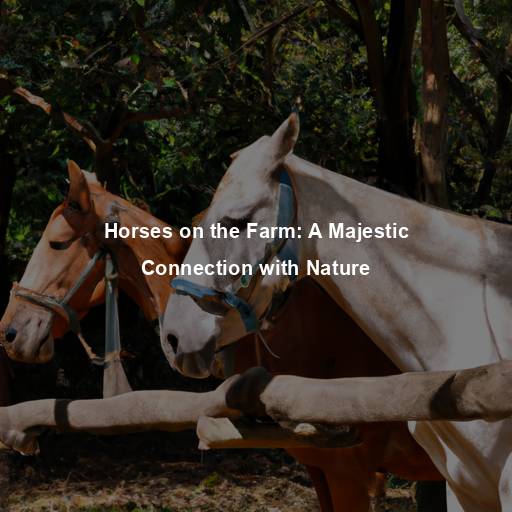Horses on the Farm: A Majestic Connection with Nature
Last Updated on November 6, 2023 by Evan
Explore the beauty and significance of horses in the agricultural landscape
Contents [hide]
- 1 The Role of Horses in Farm Life
- 2 The Bond Between Farmers and Horses
- 3 Preserving the Legacy: The Future of Horses on the Farm
- 3.1 Sustainable Farming Practices: Balancing Tradition and Innovation
- 3.2 Equine Welfare: A Commitment to Compassionate Care
- 3.3 Educating Future Generations: Cultivating a Passion for Horses
- 3.4 The Evolution of Farming Equipment
- 3.5 Complementary Roles: Finding the Balance
- 3.6 Sustainable Agriculture: Reducing Environmental Impact
- 3.7 Nurturing Tradition: Preserving Cultural Heritage
- 4 The Equine-Driven Economy: Supporting Rural Communities
- 5 The Future: Navigating Change and Embracing Opportunities
- 6 FAQs: Horses on the Farm
- 6.1 What are common tasks involved in caring for horses on the farm?
- 6.2 How much space do horses need on a farm?
- 6.3 What type of fencing is best for containing horses on a farm?
- 6.4 What do horses eat on a farm?
- 6.5 How much exercise do horses need on a farm?
- 6.6 What kind of shelter is necessary for horses on a farm?
- 6.7 How often should horses be groomed on a farm?
The Role of Horses in Farm Life
Horses have long been an integral part of farm life, serving as reliable companions and indispensable work partners for farmers all around the world. Their strength, agility, and gentle nature make them perfect for various tasks on the farm. Let’s delve into the multifaceted role horses play on the farm and the deep connection they forge with both the land and the farmers.
Plowing the Fields: The Backbone of Agriculture
Horses have historically been instrumental in plowing fields, an essential step in preparing the land for planting crops. The sheer power and endurance of these magnificent creatures enable them to pull heavy plows, tirelessly turning the earth and creating a fertile canvas for seeds to be sown. Their contribution to agriculture cannot be overstated, as they were the primary means of cultivating fields for centuries before the advent of modern machinery.
From aiding in the daily tasks of farmers to providing leisurely rides across sprawling properties, horses prove to be invaluable companions and swift means of transportation on the farm. Their noble presence brings a touch of authenticity and wonder to the landscape, allowing farmers to navigate their vast fields with ease and efficiency. These loyal creatures not only support livelihoods but also embody an eco-conscious approach to travel, making them a sustainable choice for those who appreciate a harmonious bond with nature.
Livestock Management: Herding with Grace
Horses possess a remarkable ability to work in harmony with other animals, particularly when it comes to herding livestock. Their natural instincts and agility make them excellent partners in rounding up cattle or shepherding sheep. With their calm demeanor and gentle nudges, horses assist farmers in managing their livestock, ensuring the safety and well-being of the entire herd.
Versatile Companions: Assisting in Various Tasks
Horses break free from the confines of typical farm roles, astonishingly versatile creatures that defy any one-size-fits-all label. Be it the sturdy tug of wagons or the mighty aid in logging endeavors, these magnificent equines effortlessly embrace a myriad of tasks. Their robust frames and nimble dexterity forge an unbreakable bond with farmers, effortlessly intertwining in the intricate tapestry of daily farm life.
The Bond Between Farmers and Horses
The profound connection between farmers and horses extends beyond their practical contributions to the agricultural landscape. It is a bond built on trust, companionship, and a shared love for the land. Let’s explore the unique aspects of this relationship and the profound impact it has on both farmers and horses.
Companionship: A Farmer’s Best Friend
For many farmers, horses are more than just working animals; they become beloved companions and trusted friends. Spending countless hours side by side, farmers develop deep bonds with their horses, sharing joy, hardships, and the everyday rhythms of farm life. These loyal creatures provide unwavering support and comfort, becoming an integral part of the farmer’s journey.
Mutual Understanding: Nonverbal Communication
The profound bond shared between farmers and horses goes beyond words, transcending into a realm of profound connection. It’s a dance of silent gestures and instinctive rapport, where farmers and horses glide through their work in perfect sync. This extraordinary alliance is not built overnight, but through a patient journey of understanding and reverence for the horse’s intrinsic essence.
Emotional Support: A Shoulder to Lean On
Life on the farm is an unpredictable journey filled with twists and turns. Amidst the uncertainties and hardships that come hand in hand with tilling the land, farmers find solace in the comforting company of their equine companions. Horses, with their unwavering loyalty and soothing presence, become the steadfast pillars of emotional support for those toiling on the fields. In the face of daily farm life pressures, these gentle giants offer a sanctuary of peace and tranquility, allowing farmers to recharge and find respite in the midst of their perplexing struggles.
Preserving the Legacy: The Future of Horses on the Farm
While the role of horses on the farm has evolved with advancements in technology, their significance remains deeply ingrained in agricultural traditions. As we look to the future, it is crucial to preserve and celebrate the enduring bond between horses and farmers. By embracing sustainable practices, promoting equine welfare, and nurturing the next generation’s interest in horses, we can ensure that this timeless partnership continues to thrive.
Sustainable Farming Practices: Balancing Tradition and Innovation
Finding a balance between tradition and innovation is key to the sustainable integration of horses on the farm. By combining traditional farming methods with modern techniques, farmers can harness the advantages of both worlds. Whether it’s implementing precision agriculture or utilizing eco-friendly equipment, responsible farming practices ensure the well-being of both horses and the environment.
Equine Welfare: A Commitment to Compassionate Care
As guardians of these magnificent beings, farmers are entrusted with a paramount duty to prioritize the welfare of their equine companions. This pivotal role revolves around ensuring a tapestry of nourishment, medical attention, and cozy habitats that seamlessly harmonize with their horses’ needs. Regular visits from skilled veterinarians, meticulous hoof care rituals, and sprawling pastures, among a medley of other measures, form an intricate tapestry that safeguards the flourishing existence of these beloved creatures within the tapestry of their farm abodes.
Educating Future Generations: Cultivating a Passion for Horses
In order to safeguard the horsey harmony on our farms, we must instill a fiery fervor for these majestic creatures within the souls of our next generation. By nurturing educational initiatives, orchestrating equine-centered happenings, and advocating for conscientious equine caretaking, we have the power to ignite passion and propel aspiring farmers to preserve this extraordinary alliance. Through the guidance of experienced mentors and immersive encounters, budding enthusiasts can cultivate a profound reverence for the irreplaceable contributions horses make to sustainable agriculture. It’s time to saddle up and pave the way for a future where horses and farming go hoof in hand.
The Evolution of Farming Equipment
In this era of ever-evolving technology, the realm of farming has witnessed a mesmerizing transformation, as innovative breakthroughs continue to shape the landscape. Gazing upon acres of land, one cannot help but notice the formidable presence of tractors, combines, and a myriad of other ingenious contraptions designed to streamline operations and diminish the need for laborious animal-driven efforts. While the reins of progress are firmly grasped by machines, a captivating fact endures beneath the surface – horses, steadfast and unwavering, retain their significance in the vast tapestry of agriculture.
Complementary Roles: Finding the Balance
Horses and farming equipment can complement each other, with each playing a unique role in farm operations. While machinery excels in certain tasks like heavy lifting and precision work, horses provide flexibility, agility, and a personal touch that cannot be replicated by machines. It is essential for farmers to find the right balance between utilizing modern equipment and harnessing the power of horses, ensuring optimal efficiency and productivity on the farm.
Sustainable Agriculture: Reducing Environmental Impact
When it comes to farming, there’s a secret weapon that’s been quietly making a comeback: horses. While the sight of these majestic creatures working the fields may seem like a throwback to a bygone era, the truth is, they bring a myriad of benefits that modern machinery simply can’t match. Not only do they produce fewer emissions and lessen our reliance on fossil fuels, but their gentle touch on the land also leaves a lighter footprint. By joining forces with these four-legged companions, farmers can pave the way for a more sustainable and environmentally conscious approach to food production.
Nurturing Tradition: Preserving Cultural Heritage
Beyond the practical advantages, continuing to incorporate horses on the farm helps preserve cultural heritage and farming traditions. For many farmers, horses represent a connection to their ancestors and a way of life deeply rooted in agricultural history. By maintaining the presence of horses on the farm, we honor the legacy of those who came before us and ensure that their traditions and values are carried forward.
The Equine-Driven Economy: Supporting Rural Communities
Rustic landscapes adorned with the graceful presence of horses evoke a sense of enchantment that reverberates through the hearts of individuals tending to their humble farms. Yet, the profound impact these magnificent creatures wield extends far beyond the realm of individual farmers. They hold within their hooves the delicate threads of economic prosperity, weaving together the fabric of rural communities with an intangible sense of unity and belonging. Embarking on a journey through the intricate tapestry of equine influence, we unravel the enigmatic allure of these majestic beings, understanding their role as catalysts for economic growth and communal harmony.
Equestrian Tourism: Attracting Visitors
Horses have the remarkable ability to attract tourism and draw visitors to rural areas. Equestrian tourism, such as horseback riding trails and guided tours, offers unique experiences for visitors, showcasing the natural beauty of the countryside and the rich agricultural heritage. This influx of tourists can bring economic benefits to local businesses, including accommodations, restaurants, and equestrian service providers, thereby supporting the local economy.
Equine Events and Competitions: Promoting Local Businesses
Get ready for a whirlwind of equine exhilaration! Horse shows, rodeos, and races are not just ordinary events; they are epic showcases of breathtaking skill and undeniable passion. Picture this: participants and spectators flocking en masse from all corners of the world, converging at these electrifying gatherings. And it’s not just the equine enthusiasts who benefit – local businesses experience a surge of vitality thanks to the influx of people.
Community Engagement: Bringing People Together
There’s an unmistakable magnetism that horses exude on a farm, sparking a beautiful web of connections between folks. From lively equestrian clubs to transformative equine-assisted therapy endeavors, the enchantment of these majestic creatures stitches together a fabric of meaningful interactions. Beyond the sheer joy these activities provide, they become the glue that binds communities tighter, cultivating a profound reverence for horses and the age-old charm of the agrarian lifestyle.
As we look to the future, it is crucial to adapt to the changing agricultural landscape while preserving the rich heritage of horses on the farm. Let’s explore the challenges and opportunities that lie ahead and how farmers can navigate these changes.
Embracing Technological Advancements
In the vast realm of farming, the timeless presence of horses is undeniable, yet it is equally crucial for farmers to wholeheartedly embrace the dawn of technological advancements that hold the power to amplify both productivity and efficiency. Enter the realm of precision agriculture, where the marriage of robotic systems and data-driven decision-making tools have the potential to utterly transform and redefine the very essence of farming practices. Harnessing the amalgamation of equine prowess and cutting-edge technology, farmers are poised to unlock boundless opportunities, empowering them to navigate the ongoing flux of the agricultural landscape with unwavering prowess and unwavering yields.
Diversification: Exploring New Opportunities
As farming practices continue to evolve, the search for innovative strategies to sustain agricultural livelihoods becomes ever more important. In this pursuit, farmers are venturing beyond the conventional and embracing the thrill of diversification. Harnessing the power of equine-assisted therapy and captivating agritourism experiences, farmers are unlocking new avenues of profit and stretching the boundaries of their reach. By embracing this enigmatic tapestry of possibilities, they are securing the longevity of their enterprises, leaving a lasting legacy for forthcoming generations.
Education and Advocacy: Spreading Awareness
Educating the public about the role of horses on the farm and advocating for their continued presence is crucial for their sustainability. Farmers can actively engage with their local communities through outreach programs, farm visits, and educational initiatives. By sharing their knowledge and experiences, farmers can foster a deeper understanding and appreciation for the valuable contributions horses make to the agricultural landscape.
FAQs: Horses on the Farm
What are common tasks involved in caring for horses on the farm?
Taking care of horses on the farm entails a myriad of perplexing yet essential tasks that contribute to their overall well-being. These include meticulously adhering to a structured regime of feeding and hydration, meticulously tending to their abodes – be it the cozy stalls or sprawling pastures, and diligently upholding grooming practices to maintain their lustrous manes and steer clear of mysterious dirt and obstinate tangles. Ensuring utter equine bliss entails frequent visits to the veterinary clinic for routine vaccinations and dental examinations, as well as carving out time for invigorating exercise sessions to keep the majestic creatures in peak physical form.
How much space do horses need on a farm?
When it comes to horses, having enough room to roam, graze, and stretch their legs is paramount. The necessary space varies depending on factors like breed, size, and energy levels. As a rule of thumb, each horse should ideally have access to one to two acres of lush pasture. This generous allocation not only helps prevent overcrowding and potential accidents but also allows horses to fully embrace their innate behaviors. So, if you want happy and healthy horses, give them the breathing room they deserve.
What type of fencing is best for containing horses on a farm?
Horses are powerful animals and require secure and sturdy fencing to keep them safely contained on a farm. The most commonly used and recommended fencing options for horses include wooden board fences, PVC/vinyl fences, and electric fences designed specifically for horses. These types of fences are durable, visible to the horses, and designed to minimize the risk of entanglement or injury.
What do horses eat on a farm?
When it comes to nourishing our noble equine companions, it’s crucial to cater to their unique culinary desires. These magnificent creatures showcase a particular fondness for forage, indulging in the finest hay or luscious pasture grass. In order to address the needs of hardworking horses or those with specialized nutritional prerequisites, it’s not uncommon to incorporate commercial horse feed into their meals. Striking the perfect balance between carbohydrates, proteins, fats, vitamins, and minerals is the key to a flavorful and wholesome equine diet, coupled with a constant supply of fresh water to ensure their hydration needs are met.
How much exercise do horses need on a farm?
Regular exercise is crucial to maintain a horse’s physical and mental well-being on a farm. The amount of exercise required depends on factors such as the horse’s age, breed, and overall health. Horses should have access to daily turnout in a spacious paddock or pasture to allow them to move, stretch, and graze. Additionally, engaging in activities such as riding, lunging, or other forms of exercise can help strengthen their muscles, improve coordination, and provide mental stimulation.
What kind of shelter is necessary for horses on a farm?
Horses require access to adequate shelter on a farm to protect them from extreme weather conditions. A common type of shelter is a well-designed horse barn with stalls, which provides individual spaces for each horse and protection from rain, snow, wind, or excessive heat. Alternatively, a run-in shed can also serve as a shelter that allows horses to freely move in and out as needed. The shelter should have proper ventilation, be well-maintained, and offer enough space for the horses to lie down comfortably and move around without restrictions.
How often should horses be groomed on a farm?
Regular grooming is essential for maintaining a horse’s overall health, cleanliness, and well-being. Horses on a farm should be groomed at least a few times a week, if not more frequently, depending on their specific needs and activities. Grooming includes brushing their coat, mane, and tail; cleaning their hooves; and inspecting for any signs of injuries, parasites, or skin issues. Grooming not only helps keep the horse’s coat neat and beautiful but also allows for early detection of potential health problems.







